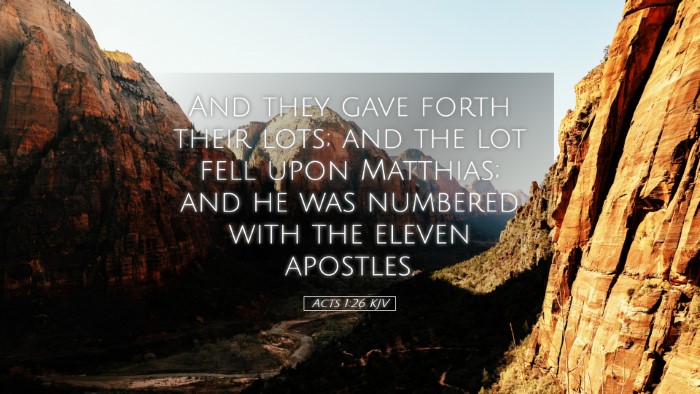Old Testament
Genesis Exodus Leviticus Numbers Deuteronomy Joshua Judges Ruth 1 Samuel 2 Samuel 1 Kings 2 Kings 1 Chronicles 2 Chronicles Ezra Nehemiah Esther Job Psalms Proverbs Ecclesiastes Song of Solomon Isaiah Jeremiah Lamentations Ezekiel Daniel Hosea Joel Amos Obadiah Jonah Micah Nahum Habakkuk Zephaniah Haggai Zechariah MalachiActs 1:26
Acts 1:26 KJV
And they gave forth their lots; and the lot fell upon Matthias; and he was numbered with the eleven apostles.
Acts 1:26 Bible Commentary
Acts 1:26 - Commentary Summary
Verse Context: Acts 1:26 states, "And they cast lots for them, and the lot fell upon Matthias; and he was numbered with the eleven apostles." This moment follows the ascension of Christ and the initial gathering of the disciples who were awaiting the promise of the Holy Spirit. The selection of Matthias represents a significant transitional moment in the early church as they sought to fill the apostolic role left vacant by Judas Iscariot.
Interpretative Insights
1. The Importance of Apostolic Succession
Matthew Henry emphasizes that the choice of Matthias underscores the early church's recognition of the need for apostolic continuity. The apostles were foundational figures in spreading the gospel, and their integrity and number were vital for the testimony of Christ's resurrection and the establishment of the church.
2. The Role of Divine Providence
Albert Barnes notes that casting lots was a common practice in the Old Testament to discern God’s will in uncertain matters. This act reflects the community's reliance on divine guidance, suggesting that by trusting in God's providence, they were acknowledging that the decision was ultimately His.
Commentary Contributions
- Matthias' Qualifications: Adam Clarke points out that Matthias had been a witness to Christ's ministry, death, and resurrection, qualifying him not only to serve as an apostle but also as a credible witness. This inclusion reinforces the point that leadership within the early church was rooted in firsthand experience and testimony.
- Casting Lots as Seeking God’s Will: The act of casting lots is instructive. It showcases a principle of submitting to God’s sovereignty, as he directs the outcome. Clarke elaborates on this, suggesting that although this practice seems foreign to modern readers, it was sufficient for an age before the indwelling of the Holy Spirit provided direct guidance for believers.
Theological Implications
1. Succession of Ministry
The transition from Judas to Matthias is more than merely a replacement; it signifies that leadership and divine appointment are paramount in the mission of the church. Pastors and theologians might reflect on the implications of appropriate succession in leadership roles within the church, ensuring continuity and faithfulness to apostolic teaching.
2. Divine Guidance in Decision Making
As noted by Matthew Henry, the account encourages believers today to seek God earnestly in all matters, particularly in leadership decisions. This highlights the broader principle that the church must continue to operate under divine guidance, particularly when discerning calls and roles.
Practical Applications for Pastoral Ministry
- Prayer and Community Consensus: It advocates for prayer and deliberation within the community when making significant decisions, a practice that strengthens the unity of the body of Christ.
- Recognition of God’s Direction: Pastors can encourage congregations to be attentive to God's leading, whether through Scripture, prayer, or communal wisdom, as they navigate leadership and ministry changes.
Conclusion
Acts 1:26 serves as a profound reminder of the early church's context as they awaited the Holy Spirit's empowerment and guidance. The selection of Matthias illustrates the blend of divine sovereignty and human responsibility in church leadership. It inspires a dedication to prayer, an understanding of God’s providential hand, and a commitment to continuity in the ministry of the Word.


